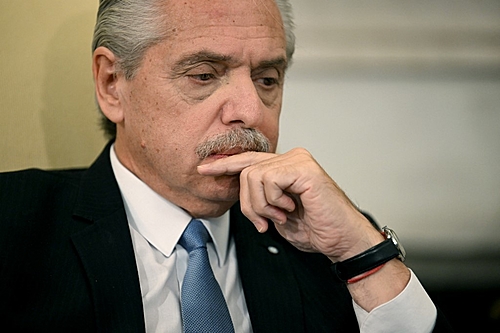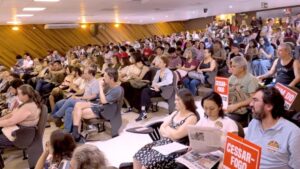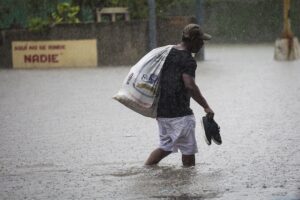
This Friday morning (21), President Alberto Fernández announced that he will not seek re-election. “The context obliges me to dedicate all my efforts to the difficult moments that Argentina is going through”, said the president through a video on his social networks entitled “My decision”.
“Next December 10th is the exact day we celebrate 40 years of democracy. On that day, I will hand over the presidential sash to whoever has been legitimately elected at the polls by popular vote,” he announced.
My decision 🇦🇷 pic.twitter.com/EEQBJaxDUz
– Alberto Fernandez (@alferdez) April 21, 2023
The president highlighted the crises that crossed his administration: the legacy of the neoliberal government of Mauricio Macri and the debt with the International Monetary Fund (IMF), the pandemic, the impacts of the war in Ukraine and, now, the drought that affects crops. from the country. “It is clear that we have not achieved everything we set out to do,” he said.
It was the first definition in the Peronist sphere that marks the course for the primary election in August. The presidential candidate for the ruling Frente de Todos (FdT) coalition is still uncertain, with internal differences in the coalition between currents linked to Fernández and segments more aligned with Cristina Kirchner. With the president’s withdrawal from seeking re-election, a spectrum of possibilities opens up for the Peronist space, since Fernández is highly rejected in opinion polls.
Peronist militancy boosts Cristina Kirchner’s candidacy
Since March, Peronist organizations have carried out a series of acts called by the Argentine media “Operation Clamor”. With the motto “Democracy or judicial mafia”, the demonstrations defend the candidacy of vice-president Cristina Kirchner and denounce the politicization of the Judiciary in the country.
The Peronist leader, the name with the greatest political and electoral weight within the movement, was sentenced in December to six years in prison and political disqualification, in a judicial process that investigated alleged embezzlement in public works in the province of Santa Cruz. Following the sentencing, Kirchner announced that he would not run in the 2023 election.
:: Cristina Kirchner is sentenced to 6 years in prison; understand the case ::
“Cristina has the possibility of running as a candidate, because there are still higher instances in the judicial process to effectively sign the sentence”, points out political scientist Romina Guilarducci. “However, what is at stake is the democratic future of our country. We have an election in a serious economic context with the main candidate and twice president without the possibility of having a fair candidacy”, she says.
If she is not the candidate, the organizations defend that she be the one to define the name of the field. The mobilizations seek to create the climate for it to do so. Julieta Campo, member of La Cámpora, a kirchnerist organization and one of the organizers of the series of acts for the candidacy of the former president, organized the plenary in the province of Chaco, which brought together organizations from the provinces of Northeast Argentina in a federal initiative following the motto ” democracy or judicial mafia”.
“In this plenary, we discussed the defense of democracy, understanding that the right wing in Argentina invests against Cristina because she crystallizes the interests of the population”, explains Campo, pointing out that the acts also involve spontaneous participation, outside of political organizations. “It’s about defending not only Cristina, but also the interests of the people”, he highlights.

Act in support of Cristina Kirchner’s candidacy, part of the initiative known as Operation Clamor. / Reproduction
Pressure on the economy
The social and economic context does not compose a favorable scenario for Frente de Todos. Recently released data shows that March saw a 7.7% month-on-month price increase, with a build-up of 21.7% inflation in the first quarter of 2023.
Furthermore, this week the country went through a new exchange rate run, with the rapid increase in the value of the parallel dollar which, despite not being linked to official dollarized transactions, leads to speculation and drives price increases. The phenomenon gained momentum with the sudden departure of Antonio Aracre, then head of advisers to President Alberto Fernández. He decided to resign after rumors that he would replace the Minister of Economy, Sergio Massa, so that he could launch the pre-presidential candidacy.
Movements in the economy’s portfolio usually have a reactive effect on the markets, generating a context of economic instability for society and, in yet another peak of peso devaluation, a sign of weakness for the government.
However, Massa has already stated on other occasions that he should not run for candidacy given the urgency of the economic crisis in the country. The name of the Minister of Economy circulates with one of Cristina’s preferred options to pass the baton. A name of weight and a long history in politics, Massa would be a non-Kirchnerist bet, even more to the right than Alberto Fernández, within the broad spectrum of Peronism.
:: With superministry, Argentine government gives in to the right in a context of crisis ::
Other names that still circulate are the Kirchneristas Eduardo “Wado” de Pedro, current Minister of the Interior, and the governor of the province of Buenos Aires, Axel Kicillof. Both would signify a generational change in the Peronist force. Until then, the only figure publicly willing to pre-candidate was Daniel Scioli, Argentine ambassador to Brazil who ran for president in 2015, supported by Cristina Kirchner – an election that resulted victorious for Mauricio Macri (Republican Proposal).
“The FdT situation must be understood taking into account two elements: what the agreement with the IMF meant in terms of breaking political diagnoses within the coalition – a sector within the coalition voted against this agreement –; and the judicial persecution against Cristina “, points out Manuel Saralegui, sociologist and member of La Cámpora.
He claims that the deputy should guide her political strength in the coming weeks. There are also possibilities that Cristina announces some definition for the FdT also at the event on May 25, May Revolution Day, where she should be the only speaker. In 2019, the vice president also announced in May the ticket she would launch with Alberto Fernández as the main candidate.
:: Cristina Kirchner accuses judicial “parallel state” in 1st public act after sentencing in Argentina ::
For now, the absence of an FdT candidate has also meant an absence of debates and the presentation of political projects, something that is already being installed in the media agenda by opposition pre-candidates. The Macrista right wing, part of the Juntos por el Cambio coalition, raises proposals involving the devaluation of the national currency in favor of entrepreneurs and agro-exporters, while the extreme right led by Javier Milei defends the dollarization of the Argentine economy.
According to the electoral calendar, the slates for the presidential primary election must be submitted by June 24th.
Editing: Thales Schmidt and Thalita Pires
Source: www.brasildefato.com.br

